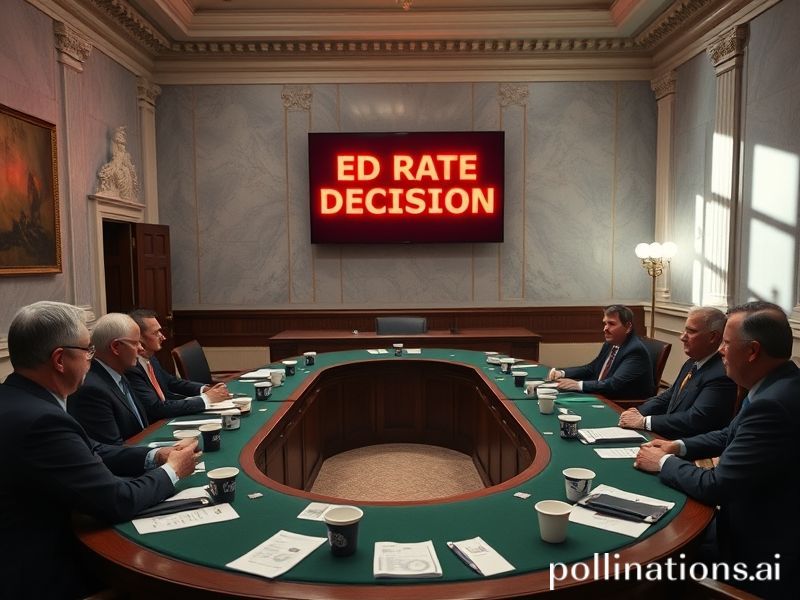Global Markets Hold Breath as Fed’s Interest Rate Circus Comes to Town
**The World Holds Its Breath While Washington Plays Interest Rate Roulette**
As Federal Reserve Chair Jerome Powell emerges from the marble temple of American monetary policy this week, global markets will be watching with the same nervous anticipation usually reserved for North Korean missile launches or Elon Musk’s Twitter feed. The September Fed meeting—essentially the world’s most influential economic séance—promises decisions that will ripple from the skyscrapers of Shanghai to the souks of Istanbul, proving once again that America’s financial mood swings remain the planet’s most contagious affliction.
The international community finds itself in the peculiar position of a dinner guest whose host is deciding whether to serve filet mignon or burnt toast. With inflation showing the stubborn persistence of a telemarketer and unemployment numbers that suggest Americans are finally discovering the joy of not working, Powell faces what economists delicately call “a proper mess.” The rest of us might call it Tuesday.
Overseas, the anticipation is palpable. European Central Bank President Christine Lagarde has been practicing her best “we’re totally independent” face, knowing full well that whatever Washington decides will force her hand faster than you can say “monetary sovereignty.” Meanwhile, emerging markets from Buenos Aires to Bangkok clutch their collective pearls, having learned through painful experience that when America sneezes, they catch economic pneumonia.
The developing world watches this ritual with particular cynicism. After decades of being lectured about fiscal responsibility by Washington, they observe American policymakers essentially choosing between slowly poisoning their economy or shooting it in the foot. It’s like watching your accountant gamble away his life savings while he prepares your tax return—technically not your problem, but you can’t help questioning his advice about your retirement planning.
China, ever the gracious superpower competitor, has been quietly building its own financial architecture while America’s central bankers perform their quarterly dance of the seven veils. The People’s Bank of China knows that every Fed hesitation, every wavering statement, every dot-plot adjustment is another brick in the edifice of dedollarization. Nothing says “end of empire” quite like your adversary watching you argue with yourself about interest rates.
The real theater occurs in the currency markets, where traders—those noble gamblers who’ve replaced astrology with technical analysis—parse Powell’s every syllable for hints about the dollar’s direction. A hawkish tilt sends the greenback soaring, turning every importer from Mumbai to Munich into an involuntary participant in America’s monetary policy experiment. A dovish surprise weakens the dollar, prompting celebration in countries whose debt is denominated in the world’s reserve currency, followed quickly by the realization that they’re celebrating being slightly less broke.
Perhaps most darkly amusing is the global faith placed in this ritual. Billions of people, from Lagos street vendors to London hedge fund managers, pin their economic hopes on twelve Americans voting in a room about something as abstract as the federal funds rate. It’s democracy’s most expensive magic trick: convincing the world that economic prosperity can be summoned through the proper incantation of economic jargon and carefully choreographed press conferences.
As the meeting concludes and Powell steps before the cameras, the world will lean in collectively, searching for certainty in an uncertain age. The irony, of course, is that the Fed’s greatest power lies not in its economic wizardry but in its ability to convince us that someone, somewhere, knows what they’re doing. In a world of climate chaos, technological disruption, and geopolitical instability, perhaps that’s the most valuable currency of all—the comforting illusion that somewhere in Washington, grown-ups are in charge.
Spoiler alert: They’re making it up as they go along, just like the rest of us.







